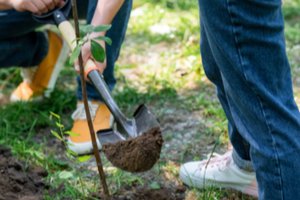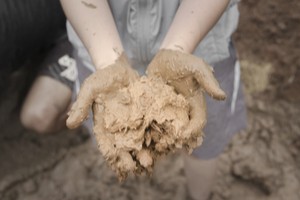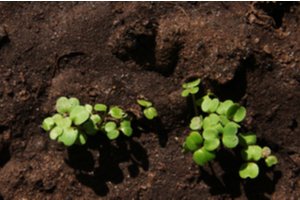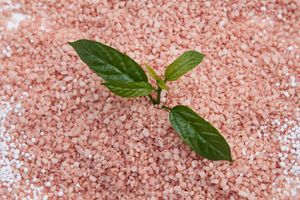Successful gardens come in all shapes and sizes, but they all tend to have one thing in common: they are grown in high-quality soil that provides the plants with the right levels of moisture and nutrients.
However, this does not mean that your growing efforts are destined to fail if your garden is not naturally blessed with good soil. By adding materials known as soil enhancers, you can transform soil with subpar qualities into the ideal ground for growing plants.
Understanding Soil

Soil is composed of organic matter, rock particles, minerals and clay. Although the term soil generally refers to the top layer of the earth’s ground covering, the soil sold for planting and gardening comes in several different varieties. Some are better at holding water, while others are known for promoting drainage or possessing a specific minerhttps://www.dirtconnections.com/where-to-buy-bulk-garden-soil-near-me/al composition that is amenable to growing a certain type of plant.
Soil is generally made up of five layers. They are, from top to bottom:
Surface Layer
The organic surface, or humus layer, is the surface of soil that your feet touch when you walk on the ground. It is largely composed of decaying organic matter.
Topsoil
Extending roughly 5 to 10 inches below the ground from the surface layer, topsoil is where you will find most of the minerals and microorganisms required for plants’ roots to grow healthy and strong, in addition to organic matter. This layer is the one that gardeners need to focus on for best results.
Subsoil
This layer is found beneath the topsoil and is made up of organic matter, iron and clay.
Substratum
Situated below the subsoil, the substratum is a highly compacted layer.
Bedrock
The bottom layer of soil is made up of hard rock known as bedrock.
Types Of Soil
When it comes to choosing the right soil enhancers, it is important to begin with an understanding of the type of soil you are working with. Here’s a brief overview of the three primary types of soil.
Clay Soil

Often used in ceramics and pottery, clay soil contains a high percentage of clay and silt. Because its particles cling together and are small, clay soil tends to hold water and nutrients well. Unfortunately, this type of soil is also highly vulnerable to compaction, which means that moisture and nutrients can struggle to reach the roots of plants, and the roots themselves may not be able to penetrate the soil. Clay soil is sticky to the touch and tends to cling to garden tools.
Sandy Soil
Made up of coarser, bigger particles, sandy soil is known for draining quickly, but it is not good at retaining moisture and nutrients. Sandy soil feels rough and does not hold together well.
Loam
Loamy soil contains a good balance of sand, silt, clay and organic material. It is widely considered the best type of soil for gardening thanks to its optimum drainage and its ability to retain moisture and nutrients. When you squeeze it lightly, loam holds its shape well. It is also easier to dig through than other types of soil.
Testing Soil
If you are unsure which type of soil is in your garden or you suspect that your soil is not ideal but you are not sure how to correct it, soil tests can provide you with important information. You can obtain a soil test kit and send it to your local Cooperative Extension office for information about the nutrients the soil is lacking as well as its pH level. This is a great starting point for choosing amendments to ensure a successful gardening project.
Choosing The Right Soil Enhancers

Many different soil enhancers, or soil amendments, can be added to soil to improve its physical characteristics. These may be chosen with a specific purpose in mind, such as reducing compaction, adding nutrients to the soil or maintaining the desired pH balance.
Here is a look at some of the most common soil amendments
Sphagnum Peat Moss
This peat moss absorbs water well and slowly releases it so that plants’ roots can get adequate hydration. It is often added to clay soil to lighten it and give it more aeration. It can also be used to provide mass to sandy soil and stop nutrients from leaching.
Homemade Compost
Many gardeners make their own compost in their yard from decomposed plant materials such as vegetable peelings, leaves and garden debris. It can improve both clay and sandy soils, enhancing plant growth and increasing the soil’s capacity for holding water. Making it is simple; gardeners just need to add organic materials to a compost bin and give them time to break down.
Garden Soil
Garden soil may sound like a generic term, but soil suppliers sell a specific mix known as garden soil that is an enhancer that can be worked into existing soil to improve its moisture retention and aeration. Many times, garden soil will also contain fertilizer to feed the plants.
Composted Manure
Composted manure enriches soil and improves its moisture retention and aeration. This odorless farm byproduct can be taken from animals such as cows, sheep, horses and chickens and the different types provide a specific set of nutrients. When using composted manure, it is best to buy from organic farms to avoid introducing unwanted herbicides and pesticides to the garden.
Mushroom Compost
This mixture of peat moss, straw and other organic components is used for one round of commercial mushroom production and then packaged as a soil enhancer for improving home gardens.
Lime And Sulfur

Lime or sulfur may be added to soil to raise or lower its pH, respectively. This is typically done in stages to avoid shocking the plants, although the full amount can be used when creating a new garden. Rake in no more than 5 pounds of lime or sulfur per 100 square feet of garden, then dig it into the ground thoroughly with a tiller or shovel for best results.
Discuss Your Project With Dirt Connections
To find out more about how you can improve your garden’s soil or arrange a delivery of dirt, get in touch with the soil experts at Dirt Connections. We offer affordable and convenient delivery throughout the Northern Virginia area, and our team is always happy to answer your questions.
Summary

Dirt Connections was started with one goal in mind: providing quality residential and commercial construction services to clients on time and on budget. Reach out for more information on how we can support your next project.
For your convenience our estimates are free and by appointment. Call 703-940-9949 for a free estimate today!









































